Charles E W Bean, Diaries, AWM38 3DRL 606/268/1 - 1917 - 1936 - Part 4
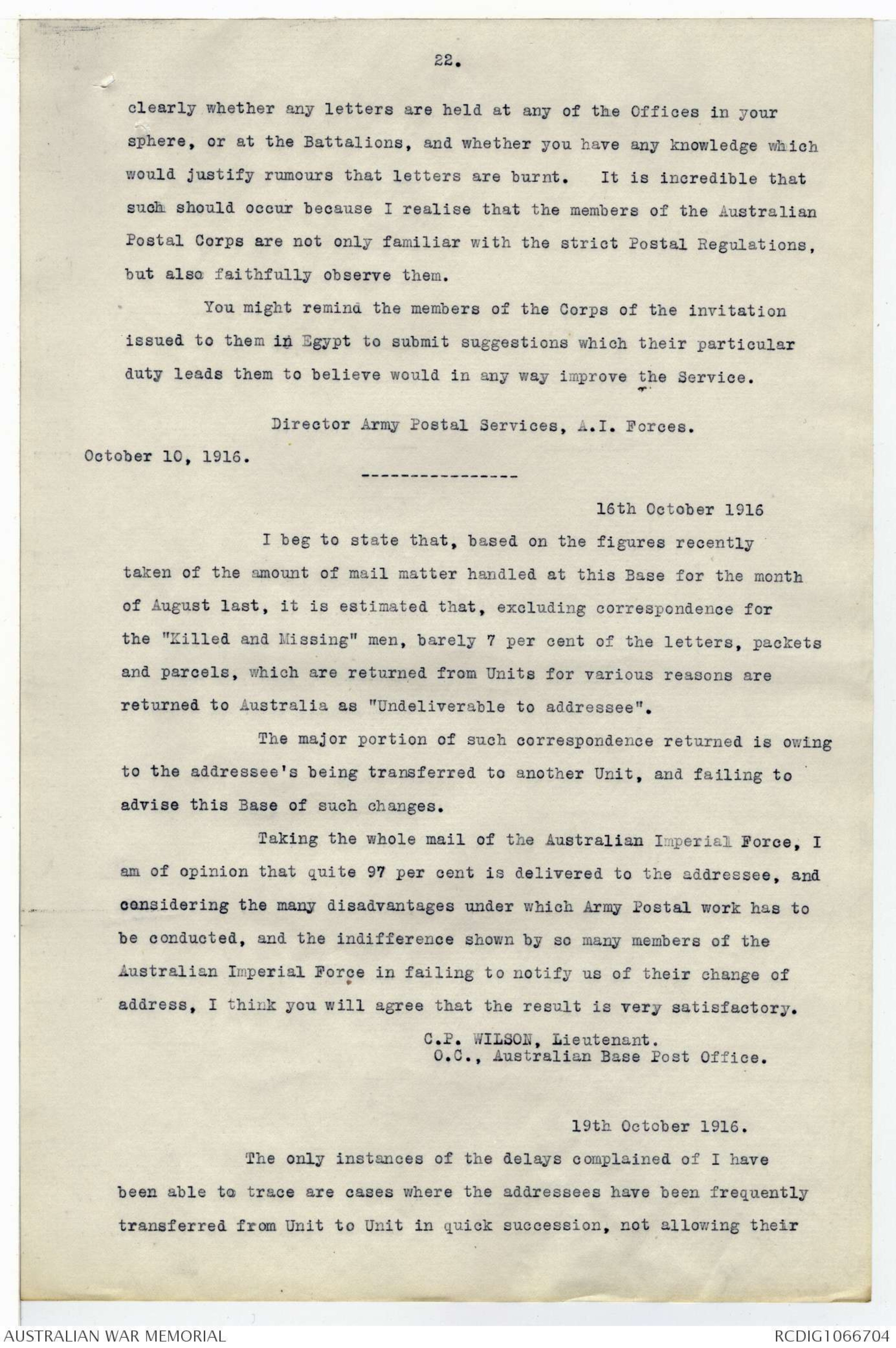
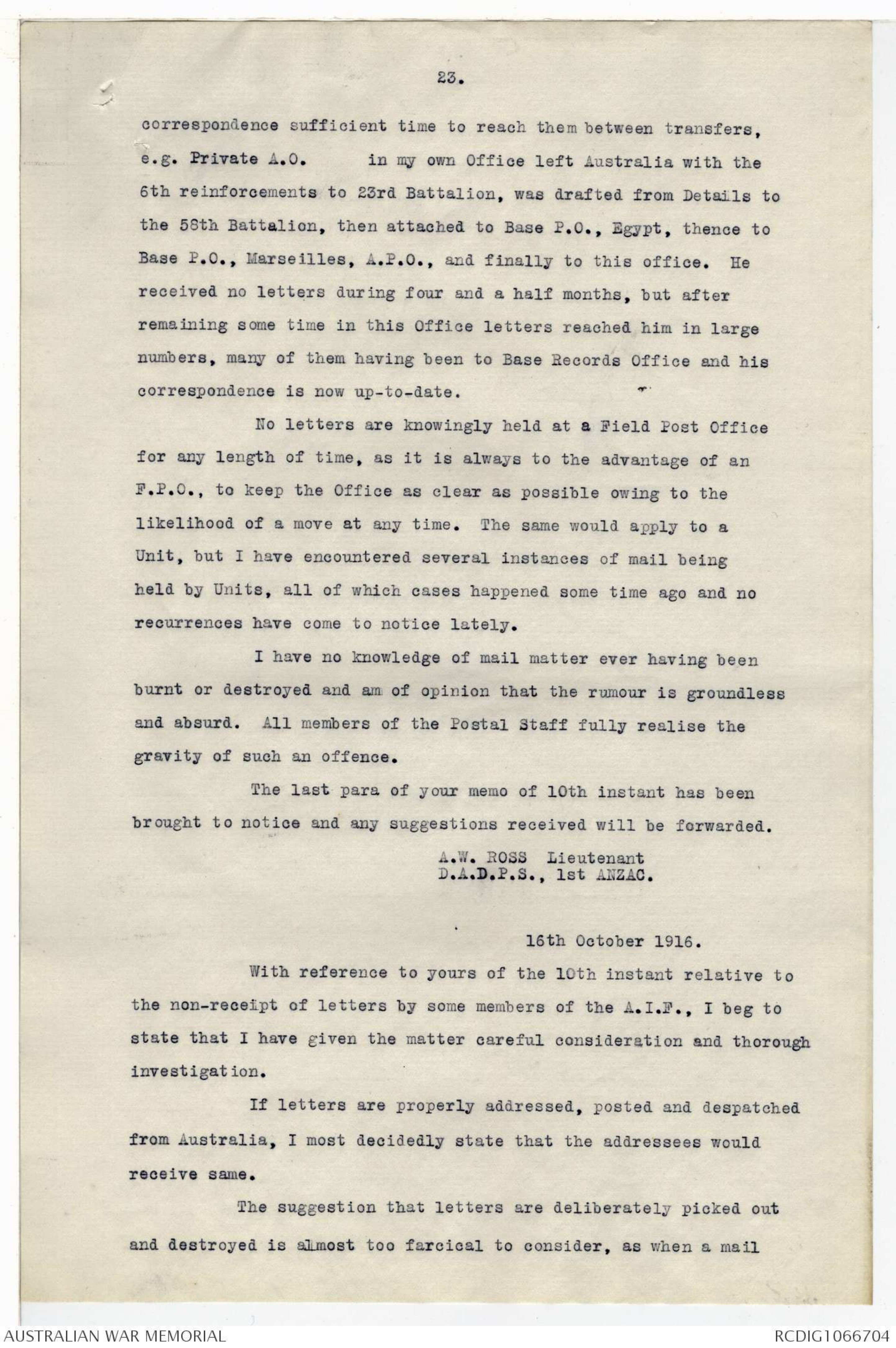
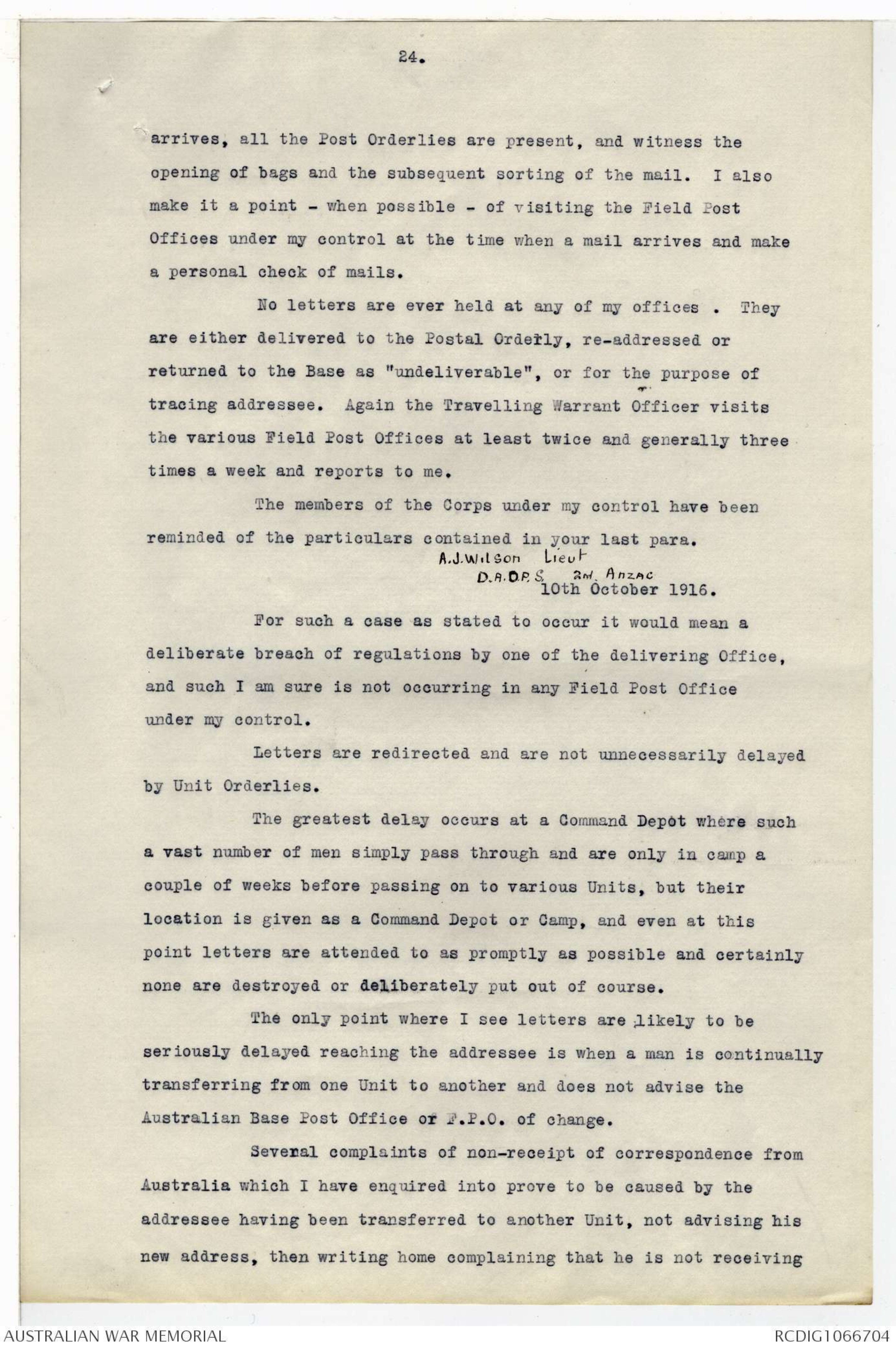
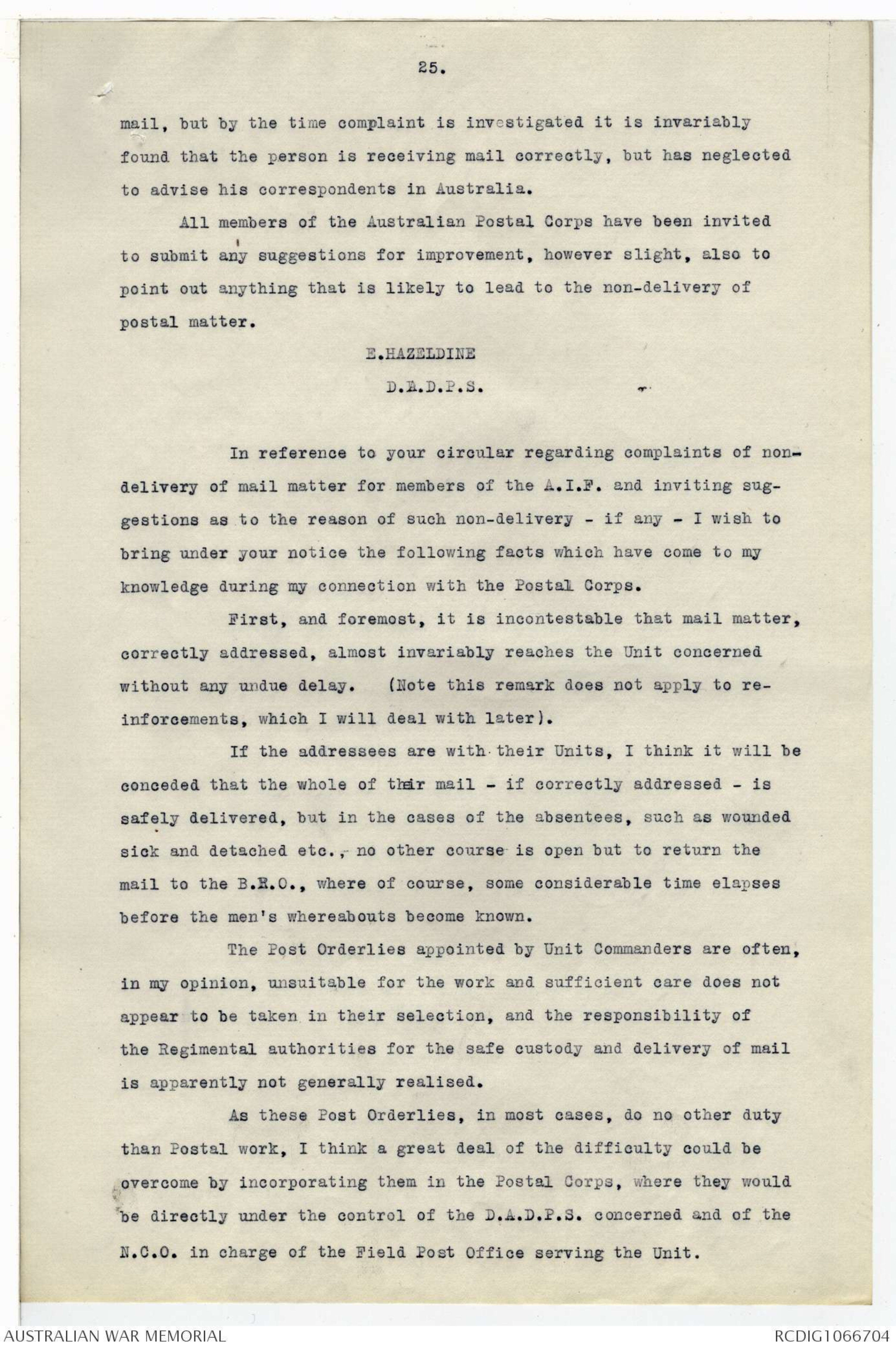
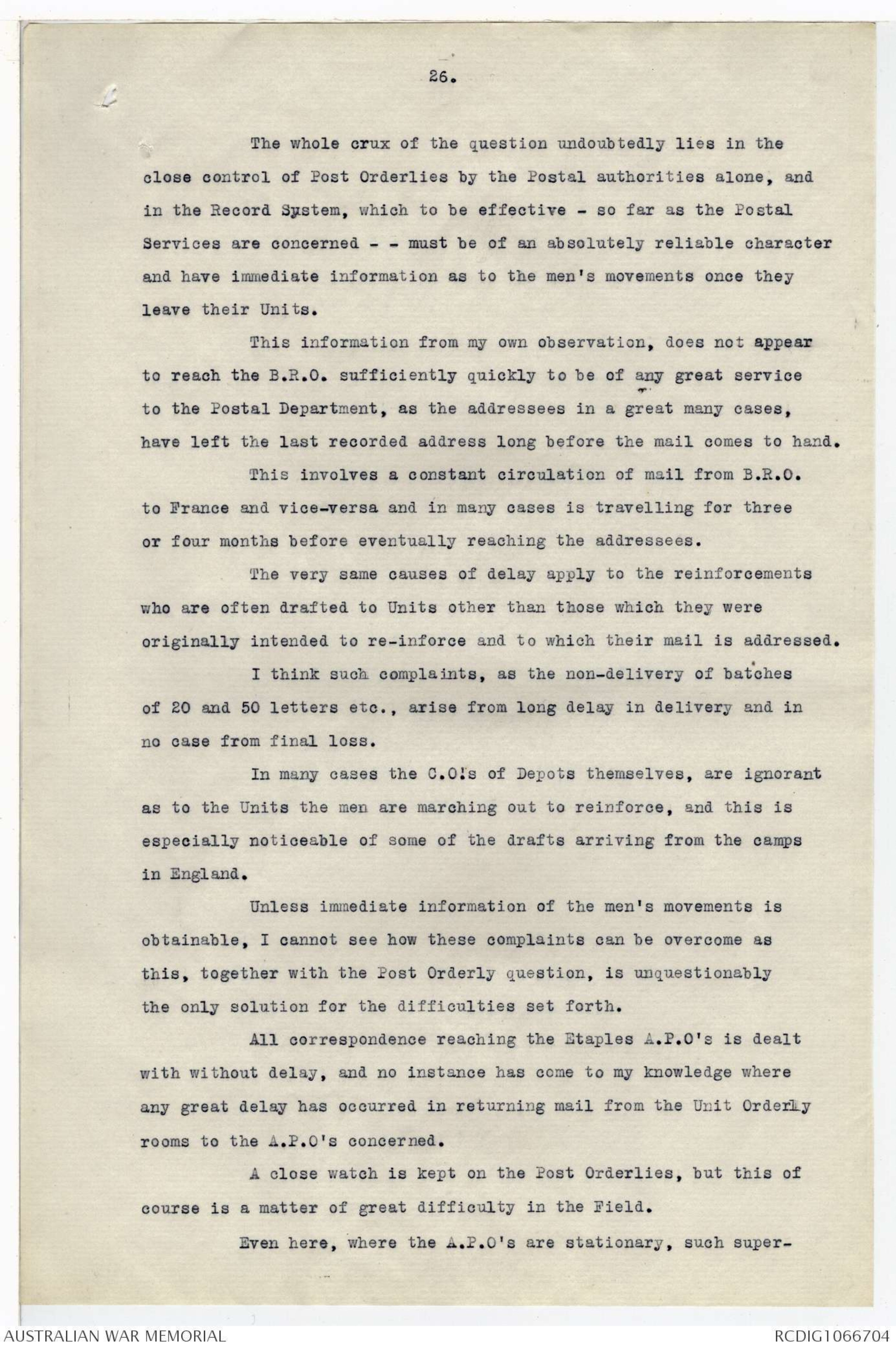
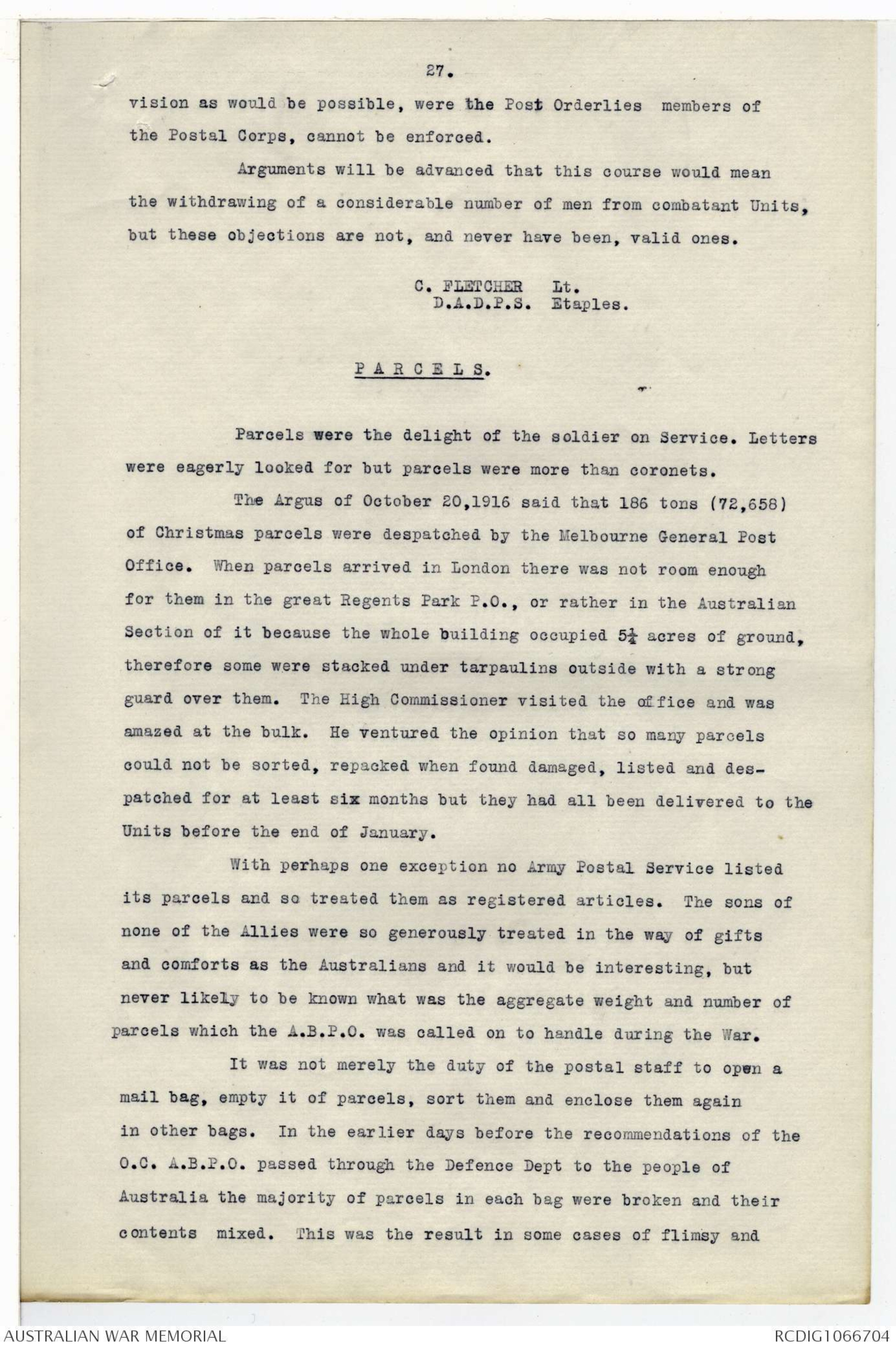
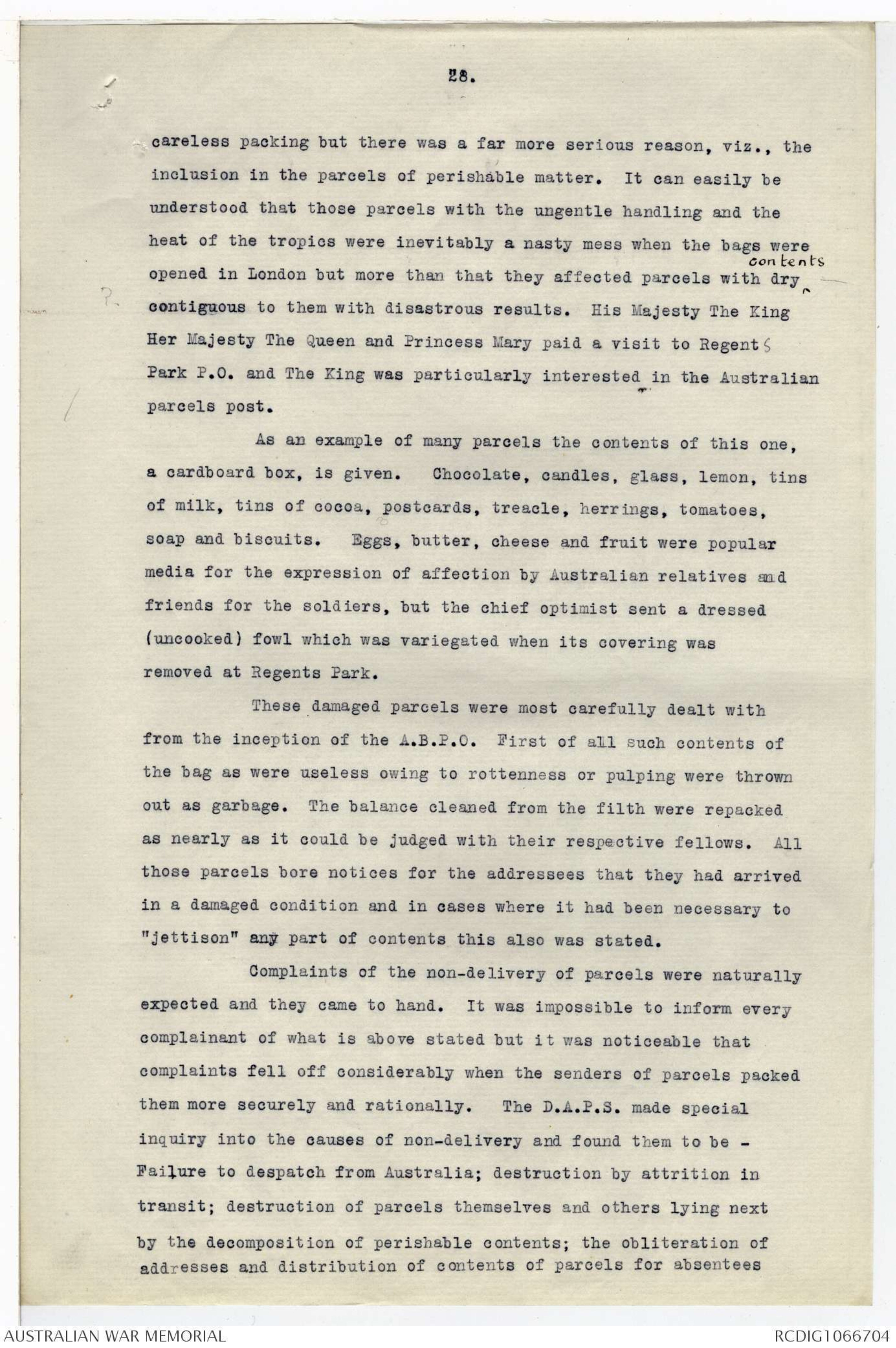
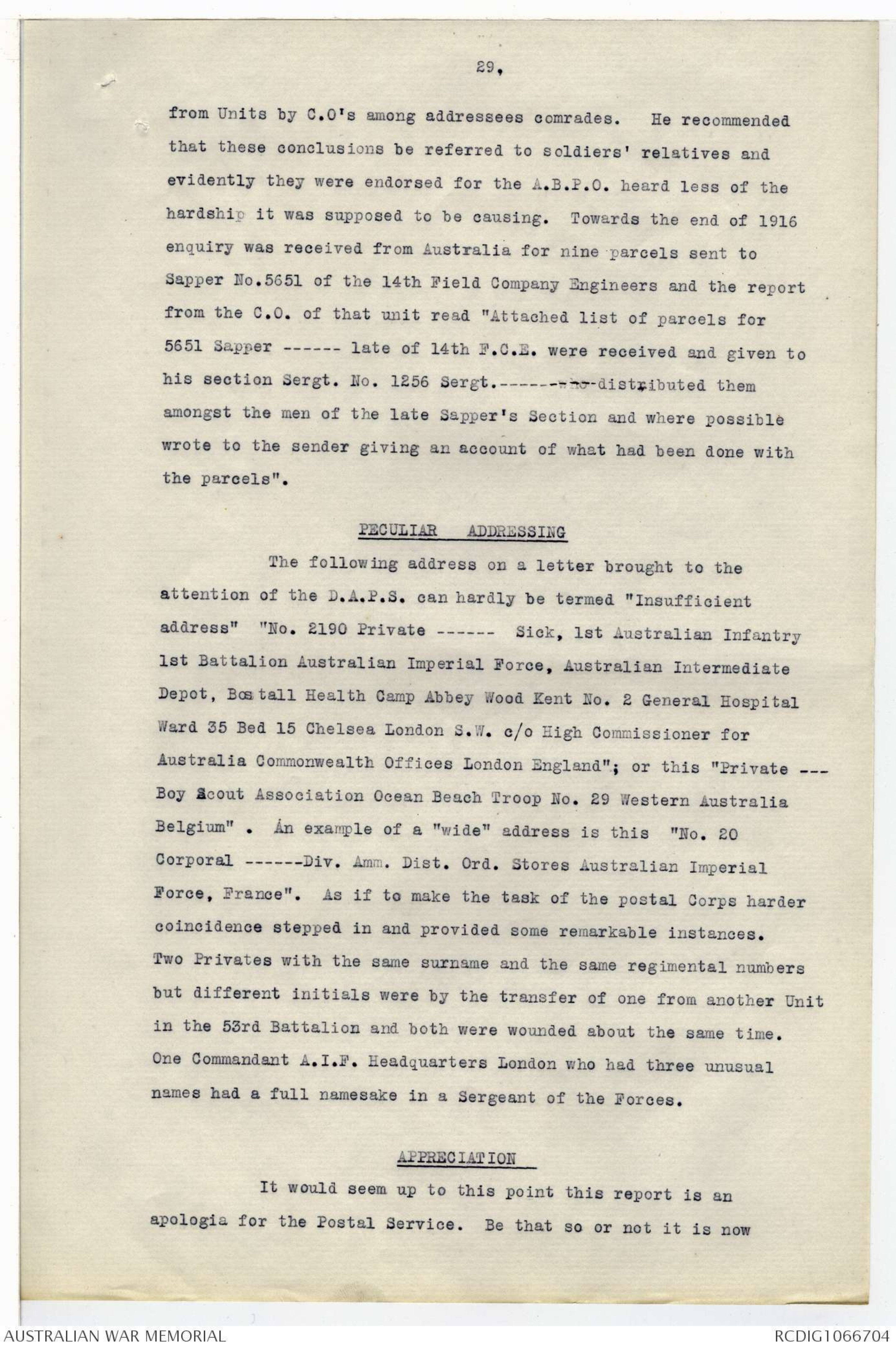
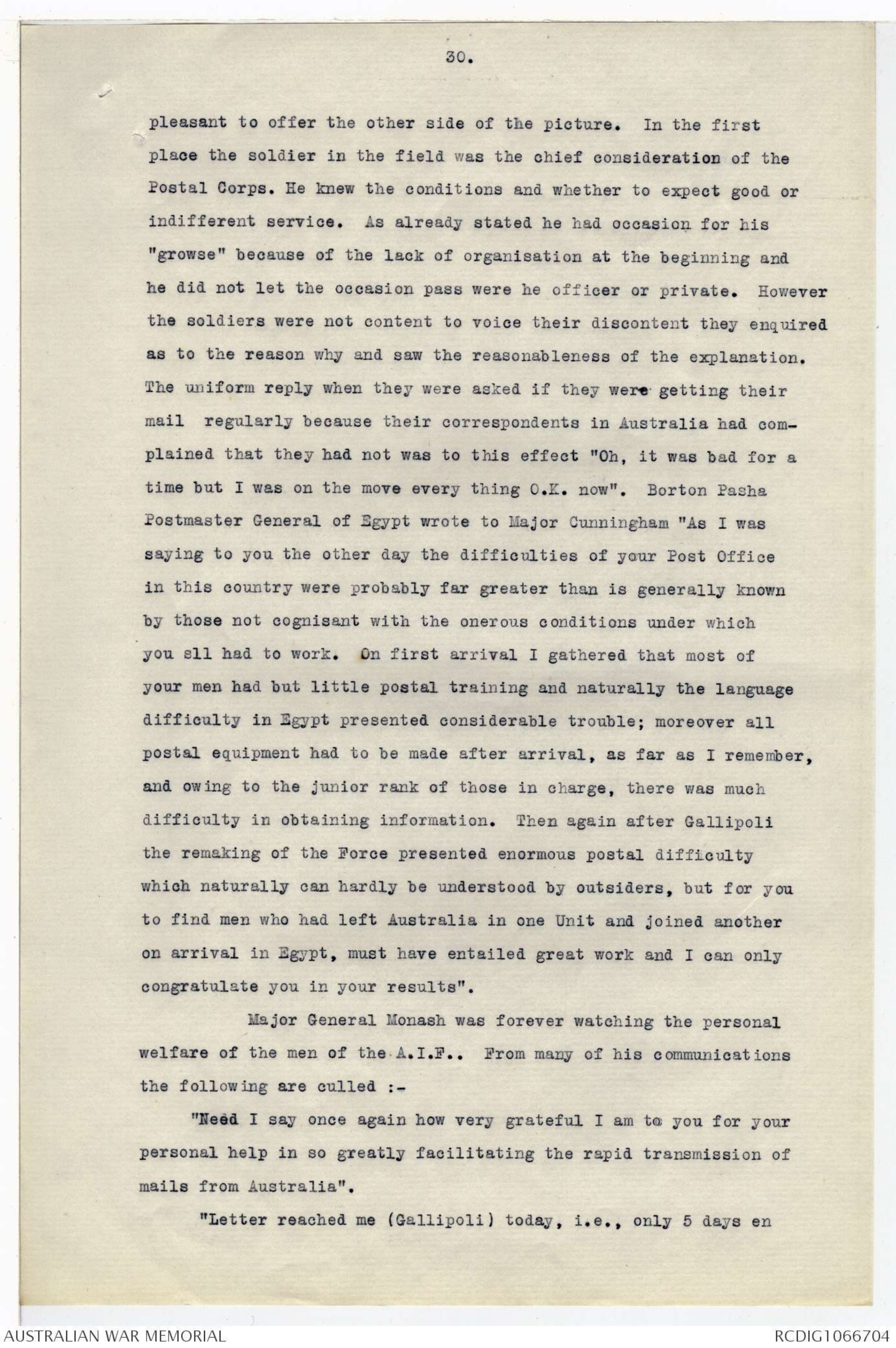
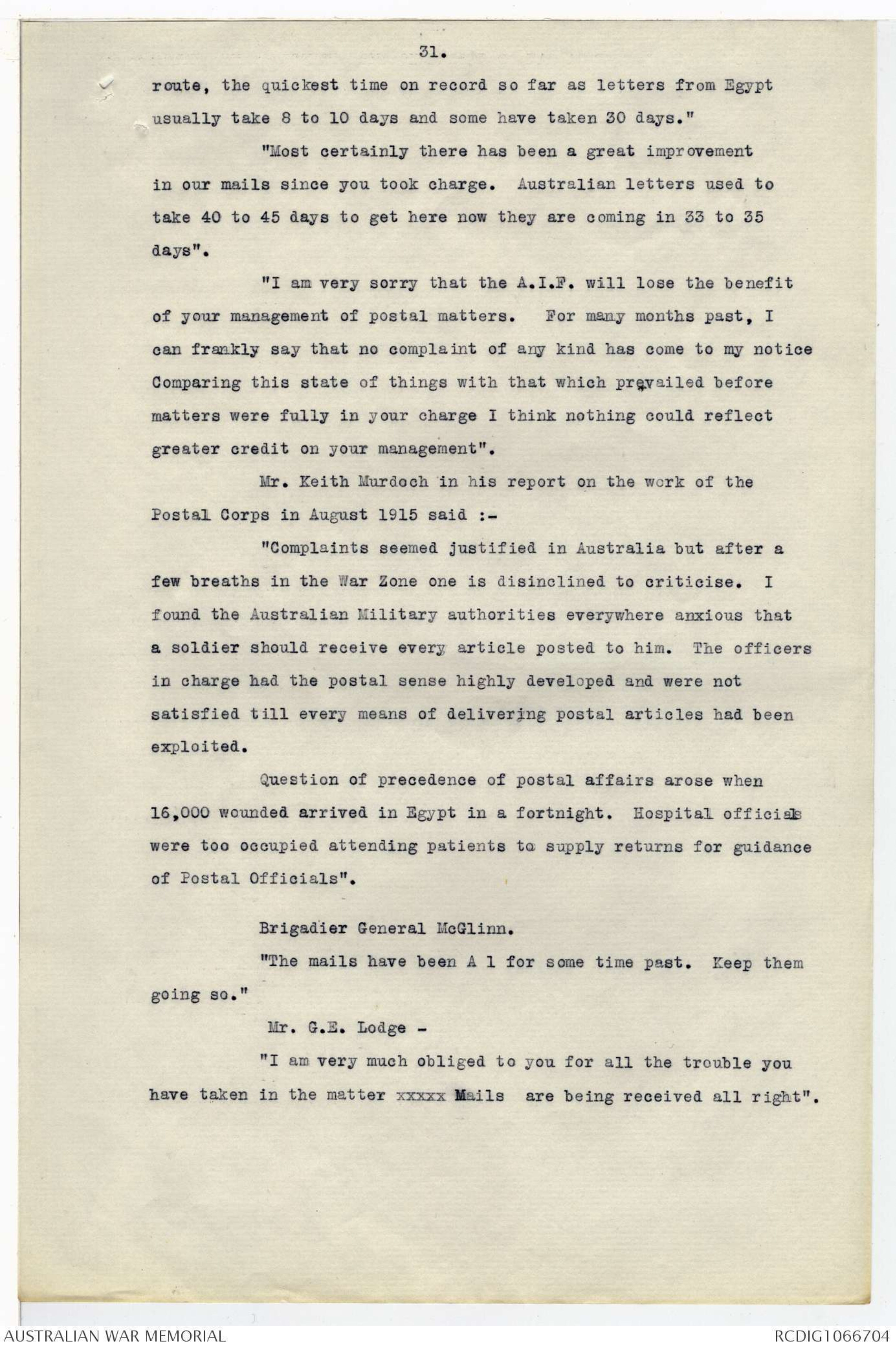
22.
clearly whether any letters are held at any of the Offices in your
sphere, or at the Battalions, and whether you have any knowledge which
would justify rumours that letters are burnt. It is incredible that
such should occur because I realise that the members of the Australian
Postal Corps are not only familiar with the strict Postal Regulations,
but also faithfully observe them.
You might remind the members of the Corps of the invitation
issued to them in Egypt to submit suggestions which their particular
duty leads them to believe would in any way improve the Service.
Director Army Postal Services, A.I. Forces.
October 10, 1916.
-----
16th October 1916
I beg to state that, based on the figures recently
taken of the amount of mail matter handled at this Base for the month
of August last, it is estimated that, excluding correspondence for
the "Killed and Missing" men, barely 7 per cent of the letters, packets
and parcels, which are returned from Units for various reasons are
returned to Australia as "Undeliverable to addressee".
The major portion of such correspondence returned is owing
to the addressee's being transferred to another Unit, and failing to
advise this Base of such changes.
Taking the whole mail of the Australian Imperial Force, I
am of opinion that quite 97 per cent is delivered to the addressee, and
considering the many disadvantages under which Army Postal work has to
be conducted, and the indifference shown by so many members of the
Australian Imperial Force in failing to notify us of their change of
address, I think you will agree that the result is very satisfactory.
C.P. WILSON, Lieutenant.
O.C., Australian Base Post Office.
19th October 1916.
The only instances of the delays complained of I have
been able to trace are cases where the addressees have been frequently
transferred from Unit to Unit in quick succession, not allowing their
23.
correspondence sufficient time to reach them between transfers,
e.g. Private A.0. in my own Office left Australia with the
6th reinforcements to 23rd Battalion, was drafted from Details to
the 58th Battalion, then attached to Base P.O., Egypt, thence to
Base P.O., Marseilles, A.P.O., and finally to this office. He
received no letters during four and a half months, but after
remaining some time in this Office letters reached him in large
numbers, many of them having been to Base Records Office and his
correspondence is now up-to-date.
No letters are knowingly held at a Field Post Office
for any length of time, as it is always to the advantage of an
F.P.O., to keep the Office as clear as possible owing to the
likelihood of a move at any time. The same would apply to a
Unit, but I have encountered several instances of mail being
held by Units, all of which cases happened some time ago and no
recurrences have come to notice lately.
I have no knowledge of mail matter ever having been
burnt or destroyed and am of opinion that the rumour is groundless
and absurd. All members of the Postal Staff fully realise the
gravity of such an offence.
The last para of your memo of 10th instant has been
brought to notice and any suggestions received will be forwarded.
A.W. ROSS Lieutenant
D.A.D.P.S., 1st ANZAC.
16th October 1916.
With reference to yours of the l0th instant relative to
the non-receipt of letters by some members of the A.I.F., I beg to
state that I have given the matter careful consideration and thorough
investigation.
If letters are properly addressed, posted and despatched
from Australia, I most decidedly state that the addressees would
receive same.
The suggestion that letters are deliberately picked out
and destroyed is almost too farcical to consider, as when a mail
24.
arrives, all the Post Orderlies are present, and witness the
opening of bags and the subsequent sorting of the mail. I also
make it a point - when possible - of visiting the Field Post
Offices under my control at the time when a mail arrives and make
a personal check of mails.
No letters are ever held at any of my offices. They
are either delivered to the Postal Orderly, re-addressed or
returned to the Base as "undeliverable", or for the purpose of
tracing addressee. Again the Travelling Warrant Officer visits
the various Field Post Offices at least twice and generally three
times a week and reports to me.
The members of the Corps under my control have been
reminded of the particulars contained in your last para.
A.J. Wilson Lieut
2w, Anzac
D.A.O.P.S. 2nd Anzac
1Oth October 1916.
For such a case as stated to occur it would mean a
deliberate breach of regulations by one of the delivering Office,
and such I am sure is not occurring in any Field Post Office
under my control.
Letters are redirected and are not unnecessarily delayed
by Unit Orderlies.
The greatest delay occurs at a Command Depot where such
a vast number of men simply pass through and are only in camp a
couple of weeks before passing on to various Units, but their
location is given as a Command Depot or Camp, and even at this
point letters are attended to as promptly as possible and certainly
none are destroyed or deliberately put out of course.
The only point where I see letters are likely to be
seriously delayed reaching the addressee is when a man is continually
transferring from one Unit to another and does not advise the
Australian Base Post Office or F.P.O. of change.
Several complaints of non-receipt of correspondence from
Australia which I have enquired into prove to be caused by the
addressee having been transferred to another Unit, not advising his
new address, then writing home complaining that he is not receiving
25.
mail, but by the time complaint is investigated it is invariably
found that the person is receiving mail correctly, but has neglected
to advise his correspondents in Australia.
All members of the Australian Postal Corps have been invited
to submit any suggestions for improvement, however slight, also to
point out anything that is likely to lead to the non-delivery of
postal matter.
E.HAZELDINE
D.A.D.P.S.
In reference to your circular regarding complaints of non-
delivery of mail matter for members of the A.I.F. and inviting suggestions
as to the reason of such non-delivery - if any - I wish to
bring under your notice the following facts which have come to my
knowledge during my connection with the Postal Corps.
First, and foremost, it is incontestable that mail matter,
correctly addressed, almost invariably reaches the Unit concerned
without any undue delay. (Note this remark does not apply to reinforcements,
which I will deal with later).
If the addressees are with their Units, I think it will be
conceded that the whole of their mail - if correctly addressed - is
safely delivered, but in the cases of the absentees, such as wounded
sick and detached etc., no other course is open but to return the
mail to the B.H.O., where of course, some considerable time elapses
before the men's whereabouts become known.
The Post Orderlies appointed by Unit Commanders are often,
in my opinion, unsuitable for the work and sufficient care does not
appear to be taken in their selection, and the responsibility of
the Regimental authorities for the safe custody and delivery of mail
is apparently not generally realised.
As these Post Orderlies, in most cases, do no other duty
than Postal work, I think a great deal of the difficulty could be
overcome by incorporating them in the Postal Corps, where they would
be directly under the control of the D.A.D.P.S. concerned and of the
N.C.O. in charge of the Field Post Office serving the Unit.
26.
The whole crux of the question undoubtedly lies in the
close control of Post Orderlies by the Postal authorities alone, and
in the Record System, which to be effective - so far as the Postal
Services are concerned - - must be of an absolutely reliable character
and have immediate information as to the men's movements once they
leave their Units.
This information from my own observation, does not appear
to reach the B.R.O. sufficiently quickly to be of any great service
to the Postal Department, as the addressees in a great many cases,
have left the last recorded address long before the mail comes to hand.
This involves a constant circulation of mail from B.R.O.
to France and vice-versa and in many cases is travelling for three
or four months before eventually reaching the addressees.
The very same causes of delay apply to the reinforcements
who are often drafted to Units other than those which they were
originally intended to re-inforce and to which their mail is addressed.
I think such complaints, as the non-delivery of batches
of 20 and 50 letters etc., arise from long delay in delivery and in
no case from final loss.
In many cases the C.O's of Depots themselves, are ignorant
as to the Units the men are marching out to reinforce, and this is
especially noticeable of some of the drafts arriving from the camps
in England.
Unless immediate information of the men's movements is
obtainable, I cannot see how these complaints can be overcome as
this, together with the Post Orderly question, is unquestionably
the only solution for the difficulties set forth.
All correspondence reaching the Etaples A.P.O's is dealt
with without delay, and no instance has come to my knowledge where
any great delay has occurred in returning mail from the Unit Orderly
rooms to the A.P.O's concerned.
A close watch is kept on the Post Orderlies, but this of
course is a matter of great difficulty in the Field.
Even here, where the A.P.O's are stationary, such super-
27.
vision as would be possible, were the Post Orderlies members of
the Postal Corps, cannot be enforced.
Arguments will be advanced that this course would mean
the withdrawing of a considerable number of men from combatant Units,
but these objections are not, and never have been, valid ones.
C. FLETCHER Lt.
D.A.D.P.S. Etaples.
PARCELS.
Parcels were the delight of the soldier on Service. Letters
were eagerly looked for but parcels were more than coronets.
The Argus of October 20, 1916 said that 186 tons (72,658)
of Christmas parcels were despatched by the Melbourne General Post
Office. When parcels arrived in London there was not room enough
for them in the great Regents Park P.O., or rather in the Australian
Section of it because the whole building occupied 52 acres of ground,
therefore some were stacked under tarpaulins outside with a strong
guard over them. The High Commissioner visited the office and was
amazed at the bulk. He ventured the opinion that so many parcels
could not be sorted, repacked when found damaged, listed and des-
patched for at least six months but they had all been delivered to the
Units before the end of January.
With perhaps one exception no Army Postal Service listed
its parcels and so treated them as registered articles. The sons of
none of the Allies were so generously treated in the way of gifts
and comforts as the Australians and it would be interesting, but
never likely to be known what was the aggregate weight and number of
parcels which the A.B.P.O. was called on to handle during the War.
It was not merely the duty of the postal staff to open a
mail bag, empty it of parcels, sort them and enclose them again
in other bags. In the earlier days before the recommendations of the
O.C. A.B.P.O. passed through the Defence Dept to the people of
Australia the majority of parcels in each bag were broken and their
contents mixed. This was the result in some cases of flimsy and
28.
careless packing but there was a far more serious reason, viz., the
inclusion in the parcels of perishable matter. It can easily be
understood that those parcels with the ungentle handling and the
heat of the tropics were inevitably a nasty mess when the bags were
opened in London but more than that they affected parcels with dry contents
contiguous to them with disastrous results. His Majesty The King
Her Majesty The Queen and Princess Mary paid a visit to Regents
Park P.O. and The King was particularly interested in the Australian
parcels post.
As an example of many parcels the contents of this one,
a cardboard box, is given. Chocolate, candles, glass, lemon, tins
of milk, tins of cocoa, postcards, treacle, herrings, tomatoes,
soap and biscuits. Eggs, butter, cheese and fruit were popular
media for the expression of affection by Australian relatives and
friends for the soldiers, but the chief optimist sent a dressed
(uncooked) fowl which was variegated when its covering was
removed at Regents Park.
These damaged parcels were most carefully dealt with
from the inception of the A.B.P.O. First of all such contents of
the bag as were useless owing to rottenness or pulping were thrown
out as garbage. The balance cleaned from the filth were repacked
as nearly as it could be judged with their respective fellows. All
those parcels bore notices for the addressees that they had arrived
in a damaged condition and in cases where it had been necessary to
"jettison" any part of contents this also was stated.
Complaints of the non-delivery of parcels were naturally
expected and they came to hand. It was impossible to inform every
complainant of what is above stated but it was noticeable that
complaints fell off considerably when the senders of parcels packed
them more securely and rationally. The D.A.P.S. made special
inquiry into the causes of non-delivery and found them to be -
Failure to despatch from Australia; destruction by attrition in
transit; destruction of parcels themselves and others lying next
by the decomposition of perishable contents; the obliteration of
addresses and distribution of contents of parcels for absentees
29,
from Units by C.O's among addressees comrades. He recommended
that these conclusions be referred to soldiers' relatives and
evidently they were endorsed for the A.B.P.O. heard less of the
hardship it was supposed to be causing. Towards the end of 1916
enquiry was received from Australia for nine parcels sent to
Sapper No.5651 of the 14th Field Company Engineers and the report
from the C.0. of that unit read "Attached list of parcels for
5651 Sapper -- late of 14th F.C.E. were received and given to
his section Sergt. No. 1256 Sergt.----------distributed them
amongst the men of the late Sapper's Section and where possible
wrote to the sender giving an account of what had been done with
the parcels".
PECULIAR ADDRESSING
The following address on a letter brought to the
attention of the D.A.P.S. can hardly be termed "Insufficient
address" "No. 2190 Private ----- Sick, lst Australian Infantry
1st Battalion Australian Imperial Force, Australian Intermediate
Depot, Bostall Health Camp Abbey Wood Kent No. 2 General Hospital
Ward 35 Bed 15 Chelsea London S.W. c/o High Commissioner for
Australia Commonwealth Offices London England"; or this "Private –
Boy Scout Association Ocean Beach Troop No. 29 Western Australia
Belgium". An example of a "wide" address is this "No. 20
Corporal -----Div. Amm. Dist. Ord. Stores Australian Imperial
Force, France". As if to make the task of the postal Corps harder
coincidence stepped in and provided some remarkable instances.
Two Privates with the same surname and the same regimental numbers
but different initials were by the transfer of one from another Unit
in the 53rd Battalion and both were wounded about the same time.
One Commandant A.I.F. Headquarters London who had three unusual
names had a full namesake in a Sergeant of the Forces.
APPRECIATION
It would seem up to this point this report is an
apologia for the Postal Service. Be that so or not it is now
30.
pleasant to offer the other side of the picture. In the first
place the soldier in the field was the chief consideration of the
Postal Corps. He knew the conditions and whether to expect good or
indifferent service. As already stated he had occasion for his
"growse" because of the lack of organisation at the beginning and
he did not let the occasion pass were he officer or private. However
the soldiers were not content to voice their discontent they enquired
as to the reason why and saw the reasonableness of the explanation.
The uniform reply when they were asked if they were getting their
mail regularly because their correspondents in Australia had complained
that they had not was to this effect "Oh, it was bad for a
time but I was on the move every thing O.K. now". Borton Pasha
Postmaster General of Egypt wrote to Major Cunningham "As I was
saying to you the other day the difficulties of your Post Office
in this country were probably far greater than is generally known
by those not cognisant with the onerous conditions under which
you all had to work. On first arrival I gathered that most of
your men had but little postal training and naturally the language
difficulty in Egypt presented considerable trouble; moreover all
postal equipment had to be made after arrival, as far as I remember,
and owing to the junior rank of those in charge, there was much
difficulty in obtaining information. Then again after Gallipoli
the remaking of the Force presented enormous postal difficulty
which naturally can hardly be understood by outsiders, but for you
to find men who had left Australia in one Unit and joined another
on arrival in Egypt, must have entailed great work and I can only
congratulate you in your results".
Major General Monash was forever watching the personal
welfare of the men of the A.I.F.. From many of his communications
the following are culled :-
"Need I say once again how very grateful I am to you for your
personal help in so greatly facilitating the rapid transmission of
mails from Australia".
"Letter reached me (Gallipoli) today, i.e., only 5 days en
31.
route, the quickest time on record so far as letters from Egypt
usually take 8 to 10 days and some have taken 30 days."
"Most certainly there has been a great improvement
in our mails since you took charge. Australian letters used to
take 40 to 45 days to get here now they are coming in 33 to 35
days".
"I am very sorry that the A.I.F. will lose the benefit
of your management of postal matters. For many months past, I
can frankly say that no complaint of any kind has come to my notice
Comparing this state of things with that which prevailed before
matters were fully in your charge I think nothing could reflect
greater credit on your management".
Mr. Keith Murdoch in his report on the work of the
Postal Corps in August 1915 said :-
"Complaints seemed justified in Australia but after a
few breaths in the War Zone one is disinclined to criticise. I
found the Australian Military authorities everywhere anxious that
a soldier should receive every article posted to him. The officers
in charge had the postal sense highly developed and were not
satisfied till every means of delivering postal articles had been
exploited.
Question of precedence of postal affairs arose when
16,000 wounded arrived in Egypt in a fortnight. Hospital officials
were too occupied attending patients to supply returns for guidance
of Postal Officials".
Brigadier General McGlinn.
"The mails have been A 1 for some time past. Keep them
going so."
Mr. G.E. Lodge -
"I am very much obliged to you for all the trouble you
have taken in the matter xxxxx Mails are being received all right".
 Sandy Mudie
Sandy MudieThis transcription item is now locked to you for editing. To release the lock either Save your changes or Cancel.
This lock will be automatically released after 60 minutes of inactivity.